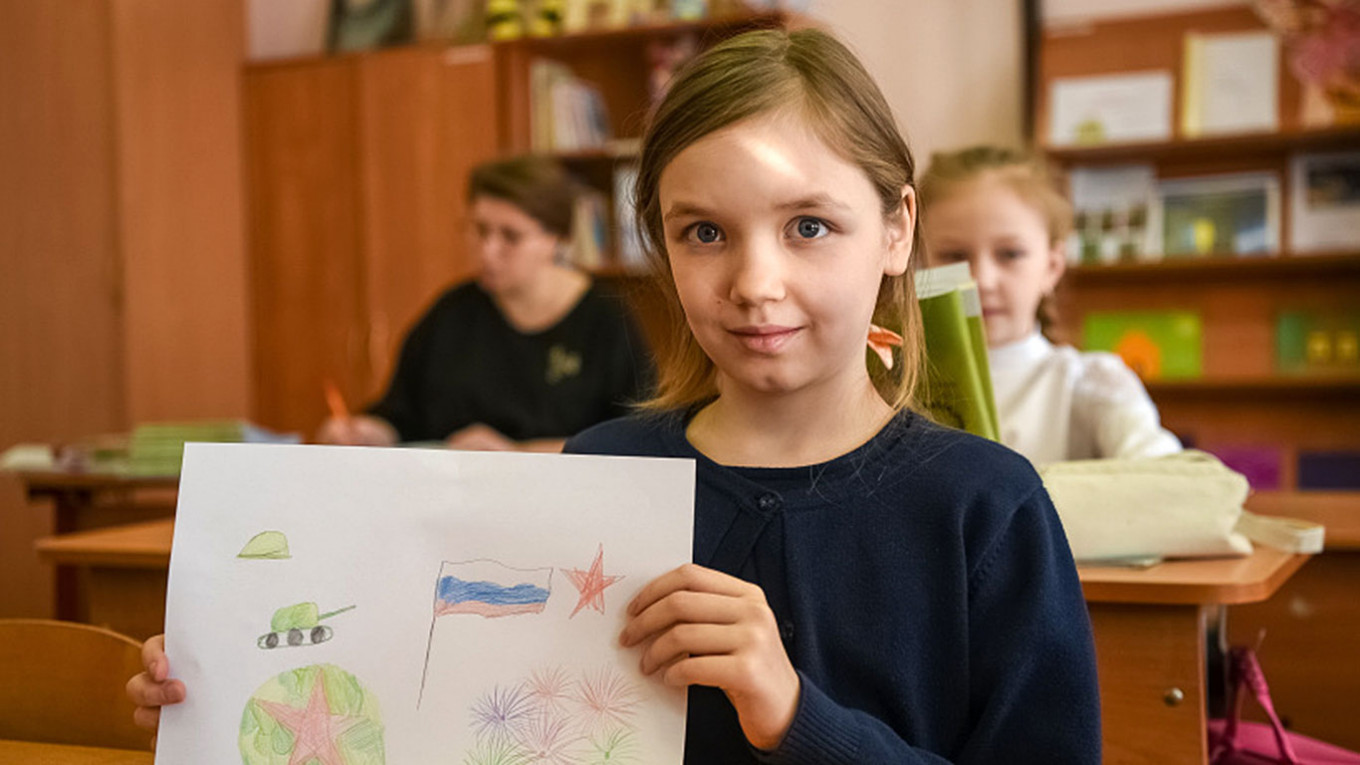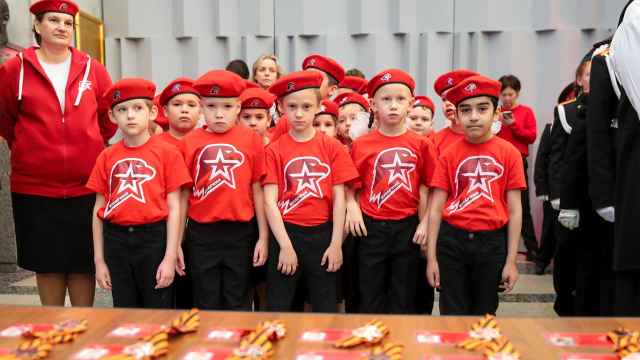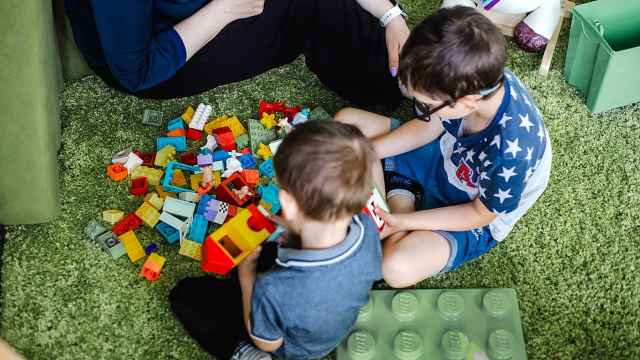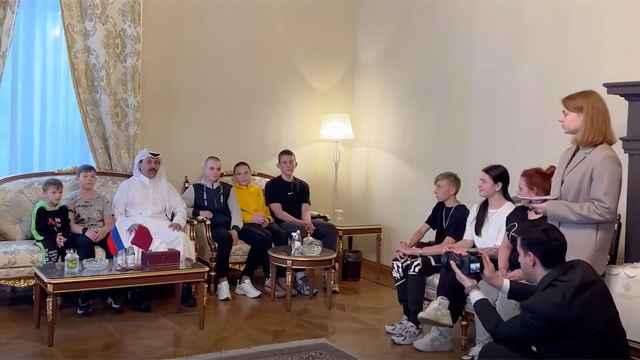When one 16-year-old student from the Siberian city of Krasnoyarsk finished class Wednesday, she and her classmates were hurriedly sent outside to the school playground.
"Two teachers stood in the foyer and told students to get outside. They weren't harsh or rude, but just loudly warned those who were hesitant to take part to follow orders and form a line," the student told The Moscow Times.
Once outside, the students were ordered to stand in a "Z" formation — a newly adopted symbol of support for Russia's bloody war in Ukraine — and photographed.
"I refused to go outside and just stood far away, looking at this shame," added the student, who asked to remain anonymous.
The letter Z first appeared painted on the sides of Russian tanks and military vehicles near Ukraine ahead of Moscow’s Feb. 24 invasion of its pro-Western neighbor and is believed to help troops identify different force contingents.
It has since become a symbol of support for Russia's Armed Forces amid their “special military operation” in Ukraine, with Russian lawmakers and state television heavily promoting it.
Although it was first adopted by the more pro-war factions of society, now Russian authorities are working to encourage civilians to adopt the symbol and publicly support a military campaign that experts say is falling short of the Kremlin's expectations.
But what started out as calls for employees of state-run institutions and cultural centers to wear the symbol has quickly spread to target students, young activists and schoolchildren — who often have little or no choice.
Photos of young people across the country adopting the symbol have flooded social media. Toddlers have been photographed lying on a playmat in a Z formation and pre-schoolers seen pictured painting their country's military symbol in the colors of the Russian tricolor.
In one particularly controversial instance, terminally ill patients at a children’s hospice were photographed standing in a Z shape in the snow.
In the republic of Sakha in far northeastern Siberia, young people are being encouraged to display the Z as part of celebrations for the anniversary of Russia’s annexation of Crimea on March 18.
"Schoolchildren, students and activists should form a letter Z while holding the Russian flag” as part of these celebrations, one letter from regional administrators in Sakha that circulated on social media told residents, encouraging people to post these photos online.
At the school in Krasnoyarsk, the teachers who organized the photo op pressured students into taking part.
"My classmate was yelled at for refusing to take part. They scolded him and said that they would tell his parents," the student said.
In addition to being pressured to show their support for what the Kremlin calls a "special military operation,” the student from Krasnoyarsk said her class was also given carefully curated lessons reflecting the Kremlin’s perspective.
"Before we were sent outside, we were given a ‘lesson of courage,’ and after that garbage, a lesson about ‘hybrid war’," the student said.
"I do not understand how my country has turned into a twin sister of the Third Reich," she added.
Opponents of the war have slammed the Z symbol as a propaganda effort aimed at redefining Russia's identity and making it easier to justify its invasion of a former Soviet state. Even harsher criticisms call it a "new swastika."
"The regime lacked a symbolic identity; after all, the Russian tricolor is the symbol of democratic Russia," Andrei Kolesnikov, a senior fellow at the Carnegie Moscow Center, told The Moscow Times.
"Fortunately for the government’s PR people, this Z appeared, and now even those who cannot verbally describe why they are for the destruction and death of former Soviet cities and former Soviet people can define their position non-verbally," he added.
Yet young people continue to be some of the fiercest and most vocal critics of the war.
According to one anonymous poll taken last week, 39% of 18-24 year olds said they were opposed to the war, a figure that analysts say is likely much higher given the risks associated with speaking out against the war.
"I know only one person who is for the war in my school. When everyone came back inside, everyone was saying how it was complete nonsense," the student from Krasnoyarsk said.
The forced mobilization of young Russians comes as the Kremlin takes harsh, far-reaching measures to shut out any independent voices that could oppose the invasion.
Virtually all independent media outlets and several Western social media platforms have been shut down or blocked since the beginning of the invasion, leaving Russians with few places left to turn for information not filtered through the government’s lens.
Despite the crackdown and censorship, pockets of anti-war sentiment continue to persist.
"I know that not all teachers support this," the student from Krasnoyarsk said. "One teacher wrote to us later, telling us to ignore that b*******. Thankfully we have at least one normal teacher.”
A Message from The Moscow Times:
Dear readers,
We are facing unprecedented challenges. Russia's Prosecutor General's Office has designated The Moscow Times as an "undesirable" organization, criminalizing our work and putting our staff at risk of prosecution. This follows our earlier unjust labeling as a "foreign agent."
These actions are direct attempts to silence independent journalism in Russia. The authorities claim our work "discredits the decisions of the Russian leadership." We see things differently: we strive to provide accurate, unbiased reporting on Russia.
We, the journalists of The Moscow Times, refuse to be silenced. But to continue our work, we need your help.
Your support, no matter how small, makes a world of difference. If you can, please support us monthly starting from just $2. It's quick to set up, and every contribution makes a significant impact.
By supporting The Moscow Times, you're defending open, independent journalism in the face of repression. Thank you for standing with us.
Remind me later.







